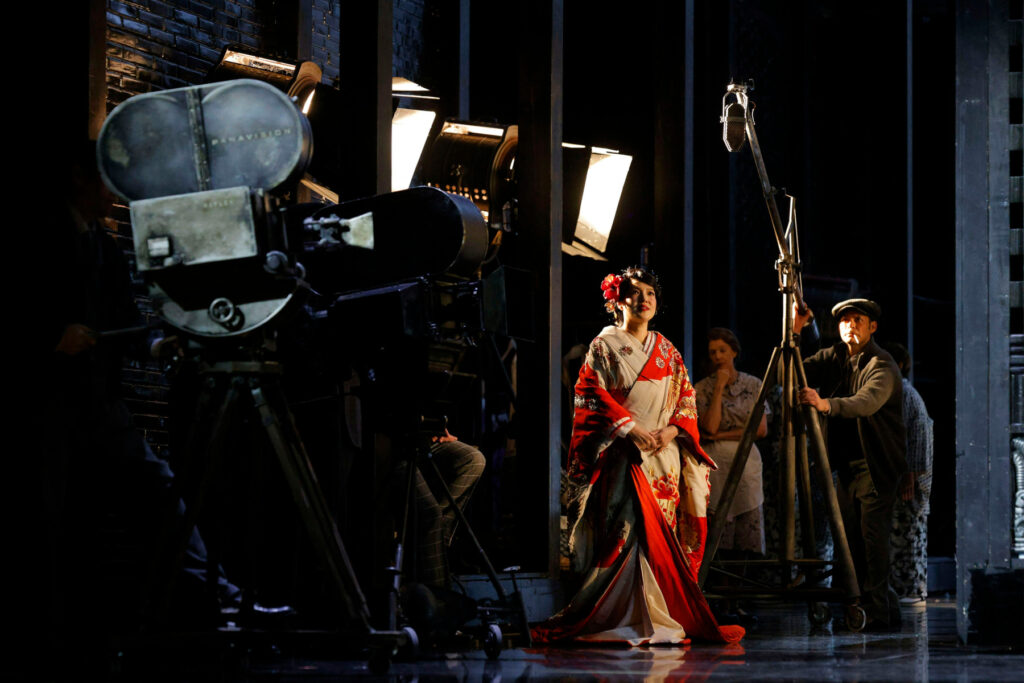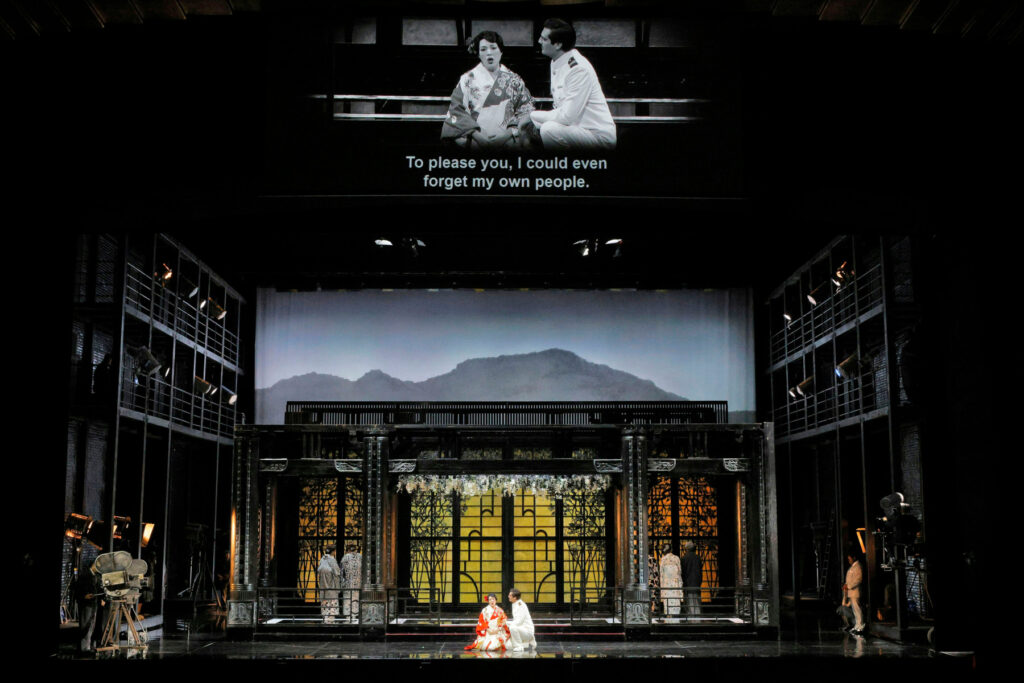All three acts of Giacomo Puccini’s Madama Butterfly take place in a tiny Japanese cottage on an isolated hill overlooking Nagasaki. Benjamin Franklin Pinkerton, an American naval officer, has purchased this modest dwelling for Cio-Cio San, a 15-year-old Japanese geisha whom he already plans to abandon. As the final curtain falls, she commits ritual suicide.
The house’s simplicity, solitude, and Japanese-ness underscore her innocence, claustrophobic loneliness and, in making her fatal decision, cultural integrity. That is what the opera is about.
Mario Gas’s glitzy new production with Ezio Frigerio’s sets, borrowed from Teatro Real in Madrid to open the LA Opera season, shatters this delicately constructed atmosphere by moving the action to something resembling a luxury mansion in Malibu. Its style is less Japanese than “crazy rich Asian” or generic “vintage” art deco. At unpredictable moments, the massive building revolves on stage. Only Franca Squarciapino’ s vividly colorful period costumes remind us of the opera as Puccini conceived it.

All this is meant to suggest a 1930s Burbank sound stage. Hordes of extras scurry about working antique camera and lighting rigs. Maybe this conceit suits contemporary Tinseltown, but remains a baffling concept in an era when everyone strives for cultural authenticity. An invocation of “white gaze” in the printed program implicitly (and, if so, unsuccessfully) seeks to justify the analogy between Puccini and the movies. From a more pragmatic perspective, opening the cavernous stage renders an already acoustically challenged hall even more so: the lack of almost any reflective surfaces dampens the heft and resonance of the singers’ voices.
Perhaps to address the lack of intimacy, this production doubles down with another LA-style move. Above the stage are projected not just the supertitles (normal nowadays) but a continuous live close-up video feed of the singers in 1930s black-and-white cinema style. In other words, it’s a Jumbotron.
Those way up in the balcony of 3200-seat Chandler Pavilion (almost three times the size of the theater where the opera premiered) and perhaps also younger audience members (used to multi-perspectival artistic presentations) may appreciate the feed. Down in the orchestra, the gentleman seated beside me also approved.

Yet, for me, digital feed on a suspended screen only exacerbates the difficulty of accessing this intimate story, already compromised by grandiose sets. Add an annoying lack of synch between stage and feed, and it proved impossible for me to avoid considering that I could have stayed home, ordered out, and streamed an opera video.
Musically, however, the show has offsetting virtues. Its highlight is LA Opera Music Director James Conlan’s veteran conducting. His rhythmic drive, impeccable rubato, and insightful orchestral voicing show how to energize a performance without needlessly calling attention to oneself. His solicitous support for the singers is a model of skilled opera professionalism.
The vocal standout among the four lead singers (three of whom also sang in a San Francisco Opera production last spring) is, curiously, Texas-born bass-baritone Michael Sumuel, who sings the self-effacing role of Sharpless. Over two decades, Samuel has quietly worked his way up to top US companies. He brings the American Consul to life with firmly precise diction, warm and smooth vocal sound, and an appropriately avuncular tone.
Chilean tenor Jonathan Teleman is a rising star with a new Deutsche Gramophon contract. Tall and handsome, he makes a dashing Pinkerton. The night I attended he was announced as indisposed and, indeed, sang with less brilliance than in the role at New York’s Met last spring. Yet the same essential limitations remain: despite some stentorian high notes, he struggles to vary an essentially brassy sound and to integrate phrases musically.
Korean soprano Karah Son, trained by legendary soprano Mirella Freni, has performed Cio-Cio San almost 300 times. Yet her account of Act 1—the night I heard her—remains vocally unfocused. Little of the title character’s youthful, pure, yet earnestly flirtatious personality came across the footlights—odd, given that Desdemona in Verdi’s Otello (which requires this style of “innocent” singing) is in her current repertoire.
Son seems more comfortable with the more romantic, at times expressionistic, and often lower-lying vocal writing in Acts 2 and 3. Yet, a tendency to press the voice at climaxes (while clutching scenery) offers some anguished thrills at the expense of deeper and subtler characterization. In the opera’s climactic thirty minutes, for example, she conveys little of how Cio-Cio San transcends her misfortunes to reclaim agency and personal dignity, returning (stereotypical though its form may be) to her noble father’s honorable tradition.
Korean mezzo Hyona Kim has recently broken through to top companies, based largely on her performance as Cio-Cio San’s loyal maid Suzuki. Like Sumuel, she sings with solid professionalism, patiently waiting to shine in occasional cameos. She and Son combine, for example, for a superb “Flower Duet,” dispatching tricky passages in thirds and fifths with elegant ease.
Philippine tenor Rodell Aure Rosel cackled and crackled as the Marriage Broker Gozo. Baritone Hyungjin Son, another singer from Seoul, added an uncommonly resonant and heartfelt cameo as Prince Yamadori. Wei Wu and Gabrielle Turgeon did what they could with the small roles of the Bonze and Kate Pinkerton.
Whatever the limitations of this production, a relatively full house (and on a Thursday) and subsequent standing ovation suggests that Madama Butterfly remains, 120 years after it was written, a sure crowd-pleaser. One final lesson: hundreds of cell phones sounding an emergency alarm during the second act remind us that it is not enough to silence cell phones at the opera. We need to turn them off.
Madama Butterfly remains at the Chandler Pavilion through October 13.
Andrew Moravcsik
Cast and production staff:
Karah Son as Cio-Cio-San; Jonathan Tetelman as Pinkerton; Hyona Kim as Suzuki; Michael Sumuel as Sharpless; Rodell Aure Rosel as Goro; Wei Wu as Bonze; Gabrielle Turgeon as Kate Pinkerton; Hyungjin Son as Prince Yamadori; Vinícius Costa as Plays Imperial Commissioner; Ryan Wolfe as Official Registrar.
Mario Gus Stage Production; Ezio Frigerio, Set Design; James Conlon, Conductor; Franca Squarciapino, Costume Design.
All photos by Cory Weaver.